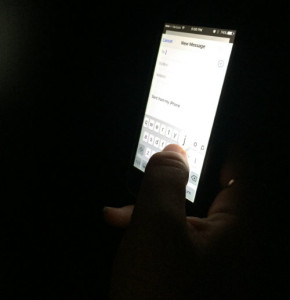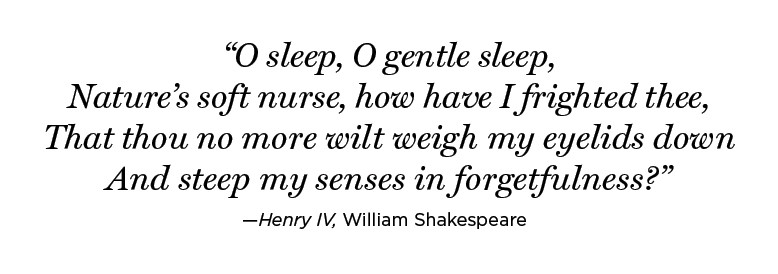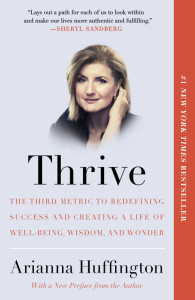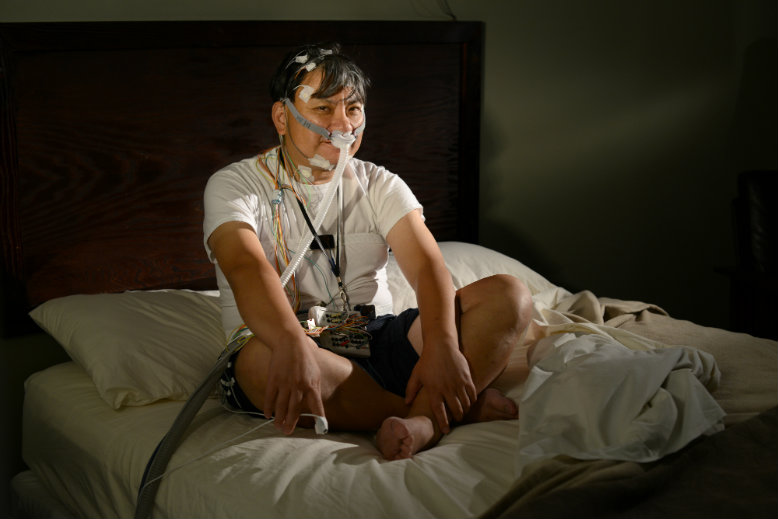
No matter the age, everyday behavior plays a large role in getting restorative sleep. Sleep specialists talk of “sleep hygiene”—habits that promote refreshing sleep and prevent daytime fatigue.

Artificial light prevents the release of melatonin. Photo by Joanna Buffum
We get sleepy at night because of our circadian rhythm. Also known as the internal clock, the circadian rhythm reinforces and promotes physiological sensations, like sleepiness, alertness and hunger, to stay in sync with the 24-hour day. This happens through internal and external cues, including the presence of light. When the bedside lamp turns off, optic nerves tell the brain it’s time to wind down, triggering a release of melatonin throughout the body, which facilitates onset of the sleep cycle.
READ MORE: Learn about circadian rhythm disorders in “Understanding Sleep Problems”
These days, our attachment to our mobile devices with illuminated screens has contributed to widespread poor sleep hygiene. Using smart phones and tablets in bed tricks the brain into delaying the release of melatonin. Curling up with a book or crossword puzzle doesn’t have that effect, since they don’t cast harsh light directly at the eyes. “We are now wired for stimulation in the middle of the night. You wake up and check your cell phone,” says Kelley, who encounters many patients who can’t resist using glowing electronics in bed. “There’s always one more website to go to or one more e-mail you can send.”
Combine a stressful lifestyle with poor sleep hygiene and you have a recipe for insomnia, the other most common sleep disorder in America—and this one is more prevalent in women. However, since insomnia and depression are typically linked, a social stigma accompanies seeking treatment for insomnia. “A very small percentage of people who have significant insomnia seek medical care,” says Benton, and those who do tend to be women. “I think that men are less likely to seek treatment, regardless of what’s going on, especially in something like insomnia, because there’s that emotional aspect tied to it,” says Dr. Vicky Seelall, a sleep specialist at Advocare Sleep and Pulmonary Associates in Madison.
When a patient comes in complaining of insomnia, Seelall takes a history to find out if she has trouble falling asleep (onset) or staying asleep (maintenance)—or both—and how long ago the problem started.
“I ask if anything happened around the time you developed insomnia to see if we can pinpoint something that caused it,” says Seelall. “Most people with insomnia are not coming here if they’ve had insomnia for one to two nights. It’s usually six months, or years.”

The most promising treatment for insomnia is cognitive behavioral therapy, or CBT-I. The tests—often given online— help sufferers learn appropriate sleep hygiene and stress-management tools.
Sleep hygiene can be life changing. When Arianna Huffington appeared at NJPAC in June as a guest on the conversation series “Trending with Scott Simon,” she talked about what motivated her to write her self-help book, Thrive. In 2007, two years after launching her media monster, Huffington Post, Huffington collapsed from exhaustion and hit her face on the corner of the desk in her home office, breaking her cheekbone. She asked the NJPAC audience: “Is that what success should look like?”
 Now, she said, getting eight hours of sleep every night has become her “keystone habit change.” Her nightly ritual involves turning off all electronic devices at least half an hour before she plans to hit the hay. Her bedside table is piled with old-school books—no electronics in sight. “My life has become so much more effective, efficient and joyful,” she said. “It’s a priority now for me because I don’t like myself when I haven’t had enough sleep.”
Now, she said, getting eight hours of sleep every night has become her “keystone habit change.” Her nightly ritual involves turning off all electronic devices at least half an hour before she plans to hit the hay. Her bedside table is piled with old-school books—no electronics in sight. “My life has become so much more effective, efficient and joyful,” she said. “It’s a priority now for me because I don’t like myself when I haven’t had enough sleep.”
READ MORE: Learn about sleep hygiene in “The ABCs of ZZZ’s”
Huffington’s nightly ritual is an example of healthy sleep hygiene. Not everyone can easily achieve that—especially people who work night shifts, such as transportation, food, health care and public-safety workers. Sleep-deprived workers in these occupations not only endanger their health, they can pose public risks. (In cases of vehicular homicide, New Jersey law classifies drivers who have been awake for at least 24 consecutive hours as “reckless”—the same classification as an intoxicated driver.)
Some employers are grappling with the problem. NJ Transit sends its employees who struggle with operating at night to sleep centers to learn appropriate sleep hygiene for their work requirements.
“Have a bath in the morning when you get home so you’re ready for bed and it relaxes you,” suggests Dimi. Get dark shades or an eye mask. “Use a white-noise machine to drown out the ambient [daytime] noise.”
Night-shift workers aren’t the only ones who need help. James Colleary, a 29-year-old chief compliance officer at Nationwide Planning Associates in Paramus, is a fan of naps. He always felt tired just after lunch. “Sometimes I would have to nap when I got home, especially on Friday,” says Colleary. “I wouldn’t be able to go out unless I took a nap.”
At Colleary’s suggestion, the company converted a large storage closet into a nap room. They painted the walls a calming shade of pistachio and added a bamboo rug, fake plants, a water fountain and a La-Z-Boy recliner. Everyone in the 20-person office is allotted two 30-minute nap slots per week and must follow the rules: no eating or drinking in the room, one person at a time, and absolutely no electronic devices. “It’s meant for rejuvenation, not to play on your phone,” says Colleary. “If you’re in there with your e-mail, then you’re not actually relaxing, which defeats the purpose.”
Three years later, the nap room is used daily. “Everyone loves it,” Colleary proudly reports. “We’ve seen happier employees, and happier employees always translates to more productive employees, so it’s been a success in every way so far.”
Jack Li is another success story. During his sleep study using CPAP, he only had about three apneas an hour, well in the normal range. He even felt refreshed the following day. “My sleep efficacy went up 95 percent…. I wish I started using it a long time ago.” At the time of this interview, his custom device was about to be delivered. “It will become my friend,” Li says, laughing. “My CPAP friend.”

Jack Li finds the right CPAP fit. Photo by Jennifer Altman




Hunterdon Pulmonary and Sleep Associates provides a full range of Pulmonary and Sleep services for the diagnosis and treatment of lung disorders, respiratory diseases and sleep disorders.You can call them at : (908) 237-1560
Or simply follow the link below
http://hunterdonpulmonaryandsleep.com/
http://hunterdonpulmonaryandsleep.com/our-physicians/
http://hunterdonpulmonaryandsleep.com/specialties/
http://hunterdonpulmonaryandsleep.com/disorders/
Hunterdon Pulmonary and Sleep Associates provides a full range of Pulmonary and Sleep services for the diagnosis and treatment of lung disorders, respiratory diseases and sleep disorders.You can call them at : (908) 237-1560
Or simply follow the link below
http://hunterdonpulmonaryandsleep.com/
http://hunterdonpulmonaryandsleep.com/our-physicians/
http://hunterdonpulmonaryandsleep.com/specialties/